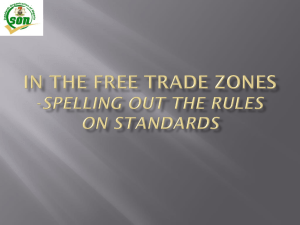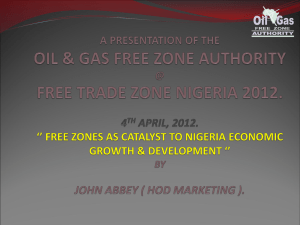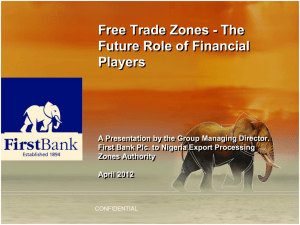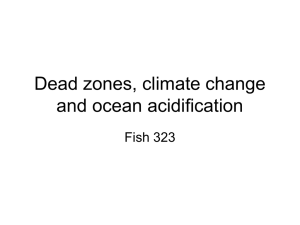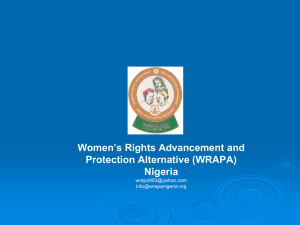NIGERIA EXPORT PROCESSING ZONE The Future Role of
advertisement
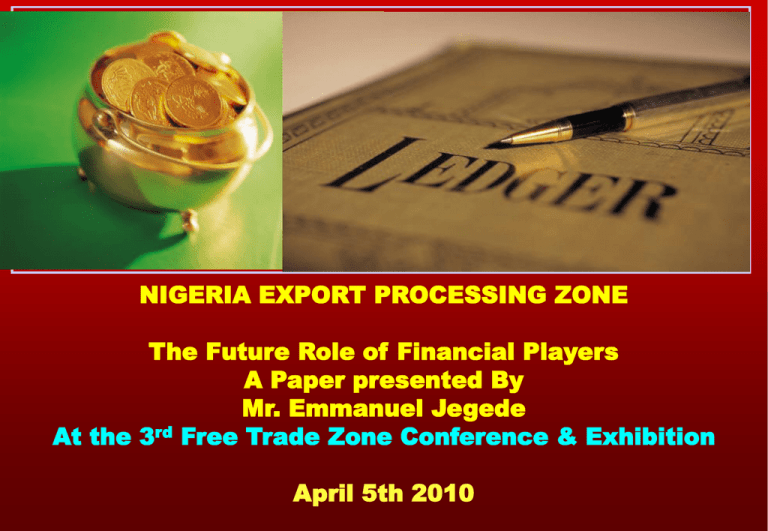
NIGERIA EXPORT PROCESSING ZONE The Future Role of Financial Players A Paper presented By Mr. Emmanuel Jegede At the 3rd Free Trade Zone Conference & Exhibition April 5th 2010 OUTLINE Preamble Authority Vested in NEPZ Business Dynamics/Investment Procedure Benefits To Licencees Major Players within the Free Zones Advantages of Free Zones The Required Infrastructures Incentives to Financial Institutions Future Role of Financial Players (Banks & Insurance) Challenges To Free Trade Zone PREAMBLE Nigeria is a country of about 160million (current statistics) with enviable deposit of natural and highly resourceful stock of human capital. Nigeria has been trumpeted to be amongst the Leading Industrial Nations in 2020 and one of the drivers and instruments that will unleash this economic quantum leap is through the mechanism of Export Processing Zone. Great nations in the world today, especially the preeminent G7 were shot up to the olympian economic height through their superior Gross Domestic Products (GDP) and other siblings of human development indexes. PREAMBLE (Contd). Our GDP in 2009 by CBN figures stood at US35.885billion and can only have a quantum leap through the mechanism of Free Zone to make our products competitive in the international arena. The Instruments of an Export Processing Zone can also be used as a tool to drive volumes of Foreign Direct Investment (FDI) into our economic fabric. Nations like the new bride, DUBAI, Singapore, China to mention but a few are now tourist destinations earning massive foreign exchange because of their productive advantage. THE AUTHORITY VESTED IN NIGERIA EXPORT PROCESSING ZONE The Licensing, Monitoring and regulation of all Free Zones in Nigeria is vested in the Authority by the Nigeria Processing Zones’ Act 63 of 1992. The Management of Federal Government Free Zones is vested in the Authority while those of States and Private entities is vested in the licensees. BUSINESS DYNAMICS/INVESTMENT PROCEDURES An Enterprise within a Free Zone must be given approval by the Authority for permit to commence operations. An approved Enterprise is expected to commence operations within six months of the date of execution of the lease agreement. The Investment of an Approved Enterprise within the free Zone is expected to be at least US$500,000,00 BENEFITS TO LICENCEES Legislative provisions pertaining to taxes, levies duties and foreign exchange regulations shall not apply within the free zones. Remittance of profits and dividends earned by foreign investors in the zones. No import or export license shall be required. Up to 100% of production may be sold in the customs territory against a valid permit, and no payment of appropriate duties. Rent free land at construction stage, thereafter rent shall be as determined by the Authority or Zone Management. Up to 100% foreign ownership of business in the zones allowable. MAJOR PLAYERS WITHIN THE FREE ZONE The Licencees The Banks THE NIGERIA EXPORT PROCESSING ZONES AUTHORITY (THE REGULATOR) Insurance Companies The Nigeria Customs service The Nigeria Immigration service ADVANTAGES OF FREE ZONES Diversifications of the revenue base of the economy. Employment Generation Encourages export through local production. THE REQUIRED INFRASTRUCTURE GRID Large expanse of industrial land with good access to international airports and sea ports Fenced wall around the Zones with good security network Trained Free zone customs/immigration roles as obtained in the Free Zones world wide Police post to provide security for the Zone Pre built zone warehouses for ware-housing and storage of raw material and products Efficient Telecommunications facilities Uninterrupted Electricity and Water Supply Good Internal/external Road Network Central Transit warehousing facilities at major ports for efficient handling of free zone goods. INCENTIVES TO FINANCIAL INSTITUTIONS WITHIN THE FREE ZONE A Bank operating in Nigeria’s FTZs enjoys the following incentives: (1)Freedom to move funds in and out of the Zone (2)Exemption of all documents from stamp duties. (3)Exemption from withholding tax requirement on interest payable on deposit, dividends and royalties. (4)Exemption from Corporate tax. (5)Interest rates on loans and deposits are free from domestic monetary controls. (6)Exemption from payment of duties on imports of furniture, office equipment and other facilities necessary for its operations. FUTURE ROLE OF FINANCIAL INSTITUTIONSTHE BANKS PERSPECTIVES Providing international relationship. correspondence banking Identification of export products , services and foreign and domestic markets. Provision of consultancy and advisory services on incentives, regulation and documentations required with the free zones Introduction of innovative trade warehousing and collateral instruments. financing, Financing of infrastructure, warehouses, provision of required working capitals. and FUTURE ROLE OF FINANCIAL INSTITUTIONTHE BANKS PERSPECTIVES Collection and management of Export proceed and payment on import by the players. Promotion of exports at local and international trade exhibitions and trade fairs. To enhance profitability of transaction, the financial institutions also provide trade and market information and advice on export-import markets, products, pricing etc based on enquiries received. Financing of all facets within the value chain from production, packages, storage handling , transportation and ultimate delivery to both local and international markets FUTURE ROLE OF FINANCIAL INSTITUTIONALTHE INSURANCE PERSPECTIVE Insurance is an ever ready risk mitigating financial instruments that provides indemnity to the Licencees whenever unexpected risk mitigating loss intervene in their business or Assets. Employees employed within the Free zone and their families are also protected from financial loss as a result of death of a bread winner. Some of the financial instruments of indemnity are: Building & Construction Insurance Group life Motor Mortgage Protection Bond Money Insurance CHALLENGES to NIGERIA FREE TRADE ZONE Unstable and inconsistent in government policies. Poor Execution of the scheme leading to undesired deliverables High Cost of goods resulting International non competiveness. in Undeveloped infrastructure like Power, good road, Rail etc Adequate funding through low interest loan to firms within the zone is still a mirage. THANK YOU FOR LISTENING 4/13/2015 16
